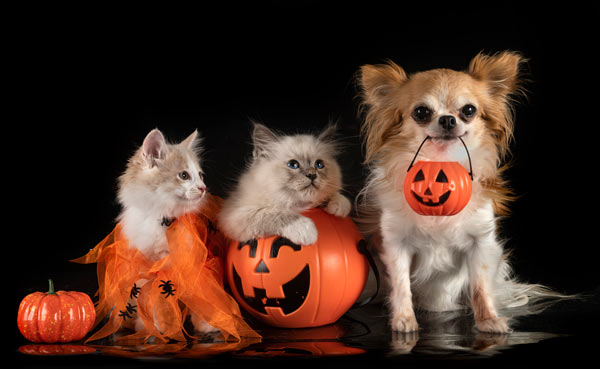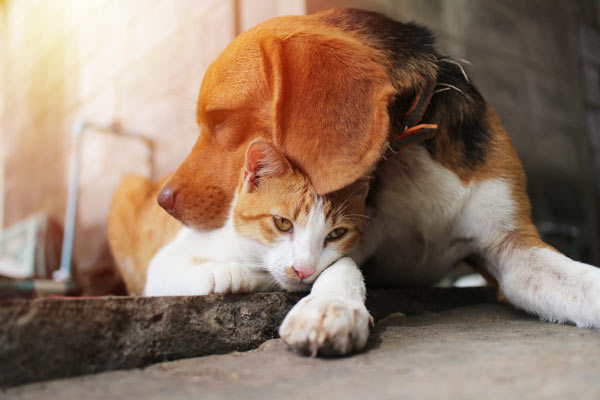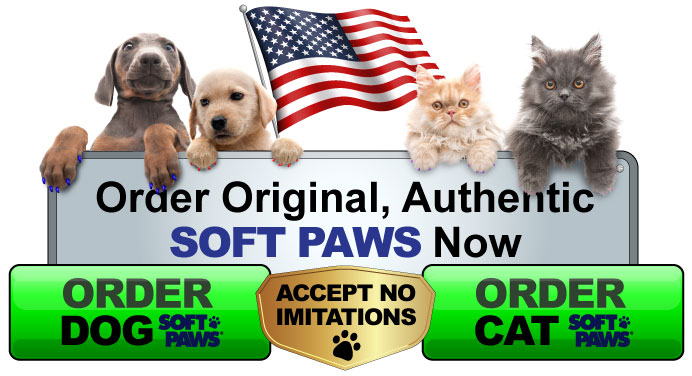- Home
- October Hazards for Cats and Dogs: Keeping Your Pets Safe This Fall

October Hazards for Cats and Dogs: Keeping Your Pets Safe This Fall

As October arrives, bringing cooler temperatures and festive celebrations, it's important for pet owners to be mindful of potential hazards that could put their furry friends at risk. While autumn offers opportunities for outdoor adventures and holiday fun, it also presents several dangers to cats and dogs. Here's a guide to the top October hazards for your pets and how to keep them safe.
1. Halloween Candy and Treats
One of the biggest hazards in October is the abundance of Halloween candy, which can be toxic to both cats and dogs.
- Chocolate: Contains theobromine and caffeine, both of which are harmful to pets. Dark chocolate is especially dangerous.
- Xylitol: A sweetener found in sugar-free candies and gum, highly toxic to dogs, causing hypoglycemia, liver failure, or even death.
- Wrappers: Foil, plastic, or cellophane wrappers can cause choking, intestinal blockages, or digestive tract injuries if ingested.
What to Do:
- Keep candy bowls and treat bags out of reach.
- Properly dispose of candy wrappers in secure trash bins.
- Educate children and guests about the dangers of feeding pets candy.
- If your pet ingests chocolate, xylitol, or wrappers, contact your vet or an emergency pet poison hotline immediately.
2. Decorations and Costumes
Festive decorations can liven up your home, but they may pose risks to curious cats and dogs.
- Chewing Hazards: Strings of lights, tinsel, and small decorations can cause electrical shock or choking if chewed.
- Pumpkins: While non-toxic, eating large quantities of pumpkins or moldy pumpkins can cause stomach upset or toxicity.
- Pet Costumes: Costumes that limit movement, breathing, or have loose parts like buttons or ribbons can be uncomfortable or dangerous.
What to Do:
- Opt for pet-friendly decorations and ensure cords and small items are out of reach.
- Dispose of carved pumpkins when they begin to decay or mold.
- Ensure costumes fit properly and allow full mobility, breathing, and comfort. Never leave a costumed pet unsupervised.

3. Doorbell and Stranger Anxiety
Halloween night can be stressful for pets with the constant ringing of the doorbell and unfamiliar visitors in costumes.
What to Do:
- Create a quiet, secure space for your pets during peak trick-or-treating hours.
- Use calming products like pheromone sprays or anxiety wraps.
- Ensure your pet is wearing proper identification, and consider microchipping if you haven't already.
4. Falling Temperatures and Cold Weather Risks
As October progresses, temperatures can drop rapidly, especially at night. Prolonged exposure to cold can lead to hypothermia or frostbite, especially in short-haired or older pets.
What to Do:
- Limit outdoor time for pets sensitive to cold.
- Consider pet sweaters or jackets for dogs with thin fur.
- Ensure outdoor shelters are dry, insulated, and protected from wind and rain.

5. Toxic Fall Plants and Mushrooms
Certain toxic plants and mushrooms thrive in October, posing a risk to pets.
- Mushrooms: Some varieties are poisonous and difficult to identify.
- Autumn Plants: Chrysanthemums and some types of ferns can cause gastrointestinal distress or more severe symptoms if ingested.
What to Do:
- Regularly check your yard for mushrooms and remove them.
- Avoid planting or bringing potentially toxic plants into your home or garden.
- Monitor your pets closely when outside to prevent ingestion of harmful substances.
6. Rodenticides and Antifreeze
As the weather cools, rodents seek shelter indoors, leading to the use of rodenticides, which are highly toxic to pets.
- Rodenticides: Ingestion can cause internal bleeding, kidney failure, or neurological issues.
- Antifreeze (ethylene glycol): Its sweet taste attracts pets, but even a small amount can cause severe kidney damage or death.
What to Do:
- Use pet-safe alternatives to rodenticides and antifreeze.
- Store these products securely and clean up any spills immediately.
- If you suspect your pet has ingested rodenticides or antifreeze, contact your veterinarian or a pet poison hotline immediately.
Conclusion: A Safe and Fun October for Pets
While this guide covers many common hazards pets may face in October, it's important to remember there are always additional risks during the fall season. Staying vigilant, educating your household, and preparing for potential dangers will go a long way in ensuring your pets stay safe and healthy.
If you suspect your pet has ingested something harmful or is in danger, time is critical. Contact your veterinarian immediately or reach out to the Pet Poison Helpline at 1-855-764-7661 for professional assistance 24/7. By taking these precautions, you can help your furry friends avoid the risks of the season and enjoy a happy, healthy fall!

 Loading... Please wait...
Loading... Please wait...




